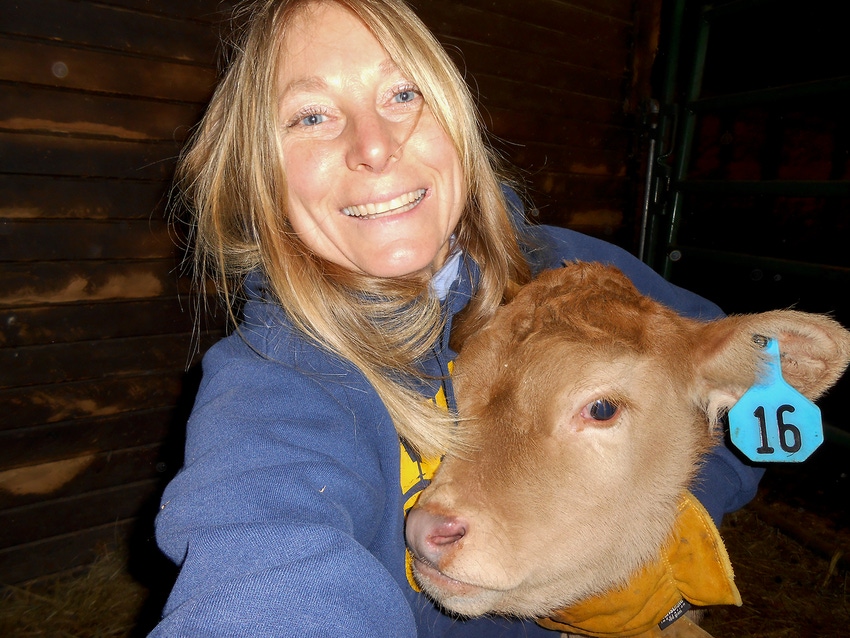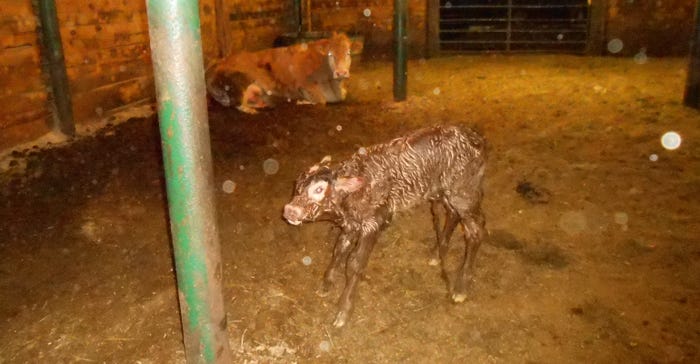January 2, 2017

One cold night, I learned three lessons of a lifetime from a poignant farm experience. Not growing up on a farm, I discovered that there is more to the farm lifestyle than tractors and crops and livestock. I learned:
• There are no guarantees.
• That there is new life, yet lost life.
• There is purpose in tragedy.
That cold night began with exhaustion before it even got started. After a long wintery work week, the battle was won against the weather, but it had taken its toll on energy levels. The beef cattle herd of 60 was tucked and fed comfortably in the barn, buffeted from the wind. Yet, there was still one more errand to run in town — so the pickup truck was fired up.
Returning to the farm along the snow-covered gravel driveway, the Friday evening sky was dark, enticing an early bedtime. But as anyone in farming knows, you do not go to bed until you check the barn one last time.
Climbing out of the pickup, the wind was wicked, but the barn was still. The darkness was eliminated when the barn lights illuminated the herd. Among the cattle herd, there was a surprise: A newborn calf greeted me at the gate. He was a stout and strong bull calf, still dripping wet from his entrance into this world.
But his momma cow was not fairing quite so well. She was an older cow, under consideration for culling. Her pregnancy was a shock, as was her postpartum condition. She lay on a dry section of bedding, unable to assist her baby. The birth had not gone right. A large section of her uterus protruded from her.
New to cattle birthing, I stared only seconds at the array of flesh and blood, then googled away on the internet, as the bull calf was dried in a clean towel. It only took moments to learn that the cow had a prolapsed uterus.
This was serious.

HELPLESSNESS: This cow looks toward her newborn calf, but helplessly cannot nurse her baby bull.
HELPLESSNESS: This cow looks toward her newborn calf, but helplessly cannot nurse her baby bull.

HELPLESSNESS: This cow looks toward her newborn calf, but helplessly cannot nurse her baby bull.
In an instant, the notion of an early bedtime blew away with the night’s cold wind. My fatigue washed away, replaced by fear and frenzy inspired by adrenaline. The cow was losing blood; the baby bull calf needed nourishment.
Despite the late Friday hour, the vet was summoned in an attempt to return the uterus to the inside of the cow’s body. He worked from behind her, as I stood to the side, being asked to put my hand inside her, applying pressure to her bloodied body parts. It looked as if the vet was trying to put an inflatable raft back into a box way too small to accommodate the size.
New to farming, I watched and participated in horror. The entire cattle herd of 60 also watched from across the aisle as the vet worked the uterus back into the momma cow. The cattle were quiet witnesses to this irregularity in the barn, very attentive, but also on high alert. They too sensed the seriousness of the cow’s condition.
After a seemingly long period of time, the vet’s patience paid off, as he accomplished his task and stitched the cow together. Upon his exit from the barn, he said he did his best, but the cow had lost a lot of blood. “There were no guarantees,” he added.
His parting words would become the first of three farm lessons to be learned on that one cold night, for it was not too long, and the cow gave her last breath. She had, in fact, lost too much blood to recuperate. Her large body lay still in the aisle with the herd looking on, wide eyes gazing from the bovine.
The deceased cow needed to be moved out the barn doors. But the herd-sire bull was not about to let that happen without his input. In his pen, the herd-sire bull moved toward the corpse in an amazing instinctual moment. He presented himself at the gate to his pen and beckoned to be let out. The bull needed to acknowledge the cow’s death. My instinct accommodated him without hesitation.
With stoic steps, the bull walked out of his pen and across the aisle to the cow’s body. As he took each step, all the eyes of the cattle in the barn were on him. The bull circled the cow’s body three times, and then paused to let out a memorable sound of sorrow. It was a bellow of sadness — not a moo, but a deep bellow of loss — announcing the passing away of the cow to the rest of the herd.
After viewing the body, the bull walked directly back into his pen. He had made his announcement and would now mourn from a distance.
That one cold night, it was the first time I had witnessed death on the farm. The second life lesson was presented — the sadness of death. But another life lesson was around the corner.
The newborn calf was motherless, the victim of this tragedy. Despite heavy sadness, I had little time to mourn her passing. The calf needed nourishment. Unbeknown at this time, that orphaned calf, which entered the world on that one cold night, would bring warmth and purpose to life. The third life lesson.
Due to the cow’s loss, human intervention would be required to meet the needs of the calf. Oh, but the joy it would bring.
From a devastating death on that one cold night, the connection and caring for the calf became a blessing. The bull calf’s life brought purpose. On days going forward, getting out of bed on a cold winter’s morning was no longer a chore. It was a pleasure to greet the orphaned bull, eager for his warm bottle. He needed nourishment and attention.
Therefore, the tragedy on that one cold night had ultimately brought triumph, and this farming experience provided life lessons. First, there were no guarantees that the momma cow would survive, but also no guarantees that the orphaned calf would bring joy. Secondly, there was new life, but still sadness in death.
But most importantly, a third life lesson was taught and it is this: There is a plan, and purpose in life can be found in tragedy.
Tomko writes from Rittman.
About the Author(s)
You May Also Like




